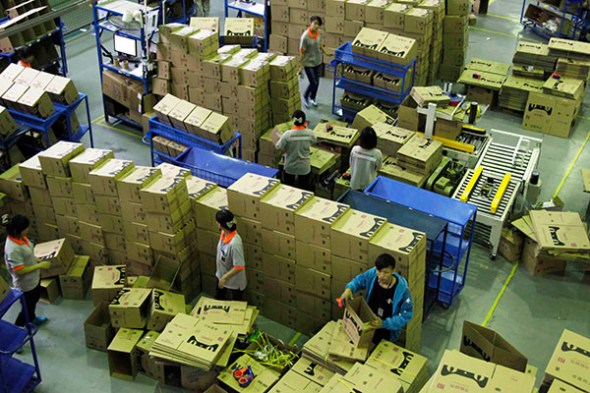
Workers from Tmall.com prepare cartons for goods that need to be sent by post at a sorting center in Guangzhou, Guangdong province. According to iResearch Consulting Group, Tmall led China's B2C market in the first quarter of this year, accounting for 58.6 percent of the 373.7 billion yuan ($61.02 billion) market between January and March. (Photo: China Daily)
Alibaba-owned site offers incentives to attract customers and score over rivals
Tmall.com, e-commerce giant Alibaba Group Holding Ltd's business-to-customer platform, is aggressively boosting its online supermarket offering with a massive national discount campaign, starting in Beijing.
Experts said the move is expected to pose a major threat to rivals in the country's nascent online superstore market, such as Wal-Mart Stores Inc's yhd.com.
Hangzhou-based Alibaba is offering cash incentives of as much as 1 billion yuan ($161 million) for Beijing consumers who order on Tmall Supermarket between July 23 and 31.
Zhang Jianfeng, the president in charge of Alibaba's retail business unit, said Tmall Supermarket will be able to make use of Alibaba's vast e-commerce ecosystem, including its supply chain and logistics network, and payments systems, to establish itself as a major player in the emerging online supermarket sector.
The announcement came as US retail giant Wal-Mart confirmed it had taken full control of China's leading online supermarket, the Shanghai-based yhd.com.
Analysts said, however, that rather than simply stealing the thunder of Wal-Mart's announcement, Alibaba's move was based on solid foundations.
Cainiao, Alibaba's logistics affiliate, also announced it is able to offer same-day delivery in Beijing for those who place their orders online before 11 am on every day during the promotion.
Wang Xiaoxing, an e-commerce analyst with Beijing-based IT consultancy Analysys International, said efficient delivery was critical for online supermarket businesses.
Experts suggest the reason there has only been limited success in China's online supermarket sector so far, unlike other areas of e-commerce such as clothing or consumer electronics, is that delivery of goods has been poor, particularly of fast-moving consumer goods.
"If delivery is not fast enough, people could go to brick-and-mortar stores instead," he said.
"Online supermarkets such as yhd.com have a good reputation for providing a wide range of food and drinks, but the size of their businesses is still quite small."
Despite the slow growth, insiders still insist China's online supermarket sector has huge growth potential, given that annual FMCG sales within brick-and-mortar superstores are currently surging by 20 to 30 percent.
"As the dominant player in China's B2C market, Tmall is grasping the majority of China's online shopping traffic and shoppers, meaning it can move very fast to gain a lot of customers buying a range of goods, and online supermarket sales are no exception," said Wang.
According to iResearch Consulting Group, Tmall led China's B2C market in the first quarter of this year, accounting for 58.6 percent of the 373.7 billion yuan ($61.02 billion) market between January and March.
Achieving that kind of dominance, however, will not be easy for Tmall Supermarket, said Mo Daiqing, an analyst with China E-Business Research Center.
"To be honest, groceries sold online are only slightly cheaper than those sold offline," she said.
"But if Tmall cannot offer a superb shopping experience, it will find it difficult to compete with offline supermarkets, especially in big cities where people can easily find them and in convenience stores, and buy whatever they need," she said.


















































